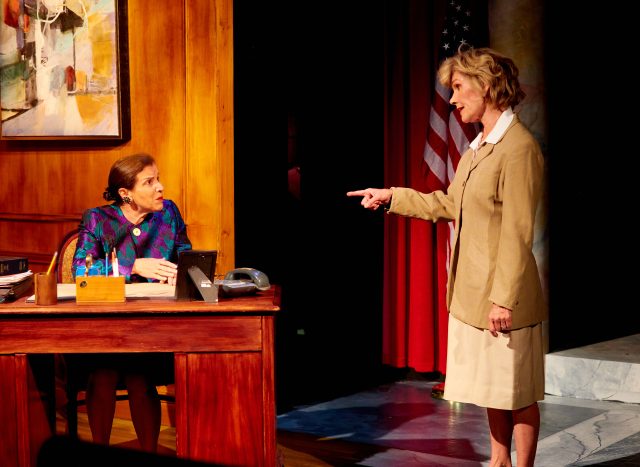
Justice is served in Sisters in Law, a hilarious and captivating play about the relationship between the first two female U.S. Supreme Court justices, Sandra Day O’Connor and Ruth Bader Ginsburg. Back by popular demand, Theatre Or presents a limited run of their Henry Award-winning production at the University of Denver’s Newman Center through Dec. 11.
Sisters in Law was written by former federal prosecutor Jonathan Shapiro and is based on Linda Hirshman’s 2015 novel of the same name. The play had its world premiere in 2019 at the Phoenix Theatre Company, with Theatre Or presenting it in Denver two years later. The latest production brings back the original local cast of Sally Knudsen as Sandra Day O’Connor and A. Lee Massaro as Ruth Bader Ginsburg (2022 Henry Award winner for Best Actress) for this ever-timely show.
Even though O’Connor, a conservative justice appointed by President Ronald Reagan in 1981, and Ginsburg, a liberal justice appointed by President Bill Clinton in 1993, came from different political parties, religions and parts of the country, they were able to find common ground through their mutual respect for the law. The play honors the pioneering judges and explores the advantages and disadvantages of the Supreme Court as a catalyst for change.
Audiences for this weekend’s final run of performances will be struck by Laura K. Love’s monumental set design. Marble steps lead up to the massive Supreme Court bench that looms large over the space. Love’s work highlights the differences between these two women through the stark contrasts in their offices, underscoring how the pair were forced to cooperate on the bench despite sharp differences in style and politics. The floor is painted to articulate this point, as the unique floors of each of their offices bleed into the united floor pattern of the Supreme Court.
The fluid staging of director Amy Feinberg uses all of Love’s deep, multi-leveled set. And despite the dialogue’s frequent use of legalese and the justices’ philosophical discussions about the specifics of Supreme Court cases, her captivating direction and outstanding lead performances by Knudsen and Massaro keep the play light.
Part of that lightness comes from the palpable onstage chemistry of Knudsen and Massaro, both of whom deliver impeccable performances. Although Massaro is cast as the more well-known Justice Ginsburg, with scenes that are skillfully written to highlight her famous dissents and trademark spunk, Knudsen more than holds her own as the upright and fashionable O’Connor. While a majority of the play is just these two women, the pair are joined by Nellie Spears and Jessica Zamrut, who play law clerks that help with set transitions and, though they don’t speak, occasionally give the justices a chance to talk to someone other than each other.
Rachel Finley’s costumes help the actors transform into the iconic justices. O’Connor’s many outfits are incredibly stylish and epitomize working-wife chic, and Ginsburg’s iconic collars and sensible fashion are faithfully imitated. Finley’s exceptional costuming and both actors’ impressive physicality allow them to portray the justices convincingly, even though neither actor resembles the justice she is portraying in real life.
The play spans 43 years, which gives the actors the chance to age their characters onstage and portray the ups and downs of their personal lives — from becoming justices and writing important opinions, to struggling with their health. In attempting to cover so much ground, the scenes are sometimes a little simplistic for the sake of exploring so much history.
Despite this occasional simplicity, Shapiro’s script manages to raise interesting questions that will stick with audiences long after the curtain closes. Written while Ginsburg was still alive, he interestingly paints the justice’s decision to stay on the court until her death as a triumphant moment. As Ginsburg explains her rationale for staying, you want to believe her, but you also know that history hasn’t worked out quite as she anticipated. Hillary Clinton lost to Donald Trump in the 2016 presidential election, and Ginsburg’s replacement on the court was an instrumental vote in overturning Roe v. Wade. It’s a powerful and unsettling ending, highlighting a profound example of real-life dramatic irony.
Sisters in Law by Jonathan Shapiro. Various times through Dec. 11, Newman Center for the Performing Arts, 2344 East Iliff Ave., Denver. Tickets here.














